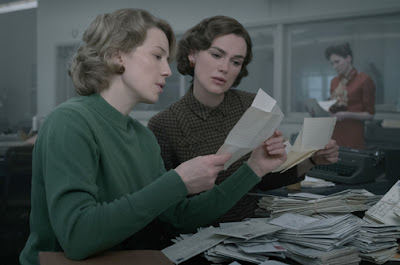This is such a colorful, effervescent sparkler: a truly giddy cinematic romp.
Director Raine Allen-Miller’s accomplished feature debut, a 2023 Sundance crowd-pleaser, has been dubbed the next evolution of romantic comedies. The elements are classic, but Allen-Miller’s execution gets much of its razzle-dazzle from Victoria Boydell’s kinetic editing and cinematographer Olan Collardy’s dynamic camera placement and lens choices, which take maximum advantage of the vibrant South London settings.
 |
| Yas (Vivian Oparah) and Dom (David Jonsson) stumble their way into a relationship against all manner of colorful and playful South London locales. |
(A refreshing change, that, given the bloat that afflicted so many recent high-profile Hollywood entries.)
Dom (David Jonsson) and Yas (Vivian Oparah) meet cute under awkward circumstances: in a bank of unisex toilets at his friend’s art exhibition, where he’s sobbing noisily in one stall, reeling from a recent break-up. Embarrassment prompts a rapid return to composure, of sorts, and that might have been the end of it.
But Yas is buoyant, giddy and difficult to ignore; she also talks a mile a minute. Dom is transfixed: a moth hovering in her incandescent glow, and a spark ignites. They linger together long enough for him to pour out his troubles, because he’s that way: wearing his heart on his sleeve. Yas is a good listener.
But then he departs, reluctantly, for a final meeting with his ex, Gia (Karene Peter), to obtain closure of a sort. That’s a difficult proposition, given that she cheated with — and now is in a relationship with — his best friend, Eric (Benjamin Sarpong-Broni). It becomes clear, as this café encounter begins, that Gia is a self-centered bee-yatch who expects Dom to be comfortable with her version of their break-up.
Before Dom can humiliate himself further, by agreeing with this nonsense, Yas unexpectedly crashes the gathering. Pretending to be Dom’s new main squeeze, she turns things completely upside-down, with a breathtaking few minutes’ worth of snide comments, subtle put-downs, not-so-subtle digs and pointed accusations. Gia and Eric can’t quite fathom what has hit them (Sarpong-Broni is hilariously clueless).
We’re on the floor, laughing so hard that it hurts.
What follows borrows from the giddy, 24-hour “chat structure” of 1995’s Before Sunrise, as Dom and Yas navigate various parts of South London. But the atmosphere here is different than that of Richard Linklater’s earlier genre classic; Allen-Miller goes more for the magical intensity of succumbing to love, when every hour — every minute — seems timeless, and a single day feels like it’ll never end.




